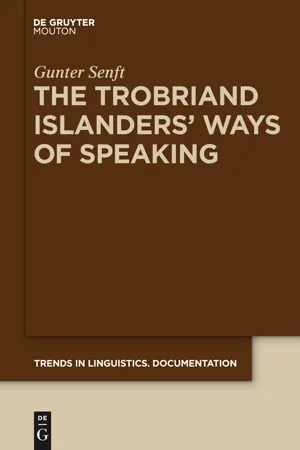
- 345 pages
- English
- PDF
- Available on iOS & Android
The Trobriand Islanders' Ways of Speaking
About this book
Bronislaw Maliniowski claimed in his monograph Argonauts of the Western Pacific that to approach the goal of ethnographic field-work, requires a "collection of ethnographic statements, characteristic narratives, typical utterances, items of folk-lore and magical formulae ... as a corpus inscriptionum, as documents of native mentality".
This book finally meets Malinowski's demand. Based on more than 40 months of field research the author presents, documents and illustrates the Trobriand Islanders' own indigenous typology of text categories or genres, covering the spectrum from ditties children chant while spinning a top, to gossip, songs, tales, and myths. The typology is based on Kilivila metalinguistic terms for these genres, and considers the relationship they have with registers or varieties which are also metalinguistically distinguished by the native speakers of this language.
Rooted in the 'ethnography of speaking' paradigm and in the 'anthropological linguistics/linguistic anthropology' approach, the book highlights the relevance of genres for researching the role of language, culture and cognition in social interaction, and demonstrates the importance of understanding genres for achieving linguistic and cultural competence.
In addition to the data presented in the book, its readers have the opportunity to access the original audio- and video-data presented via the internet on a special website, which mirrors the structure of the book. Thus, the reader can check the transcriptions against the original data recordings. This makes the volume particularly valuable for teaching purposes in (general, Austronesian/ Oceanic, documentary, and anthropological) linguistics and ethnology.
Frequently asked questions
- Essential is ideal for learners and professionals who enjoy exploring a wide range of subjects. Access the Essential Library with 800,000+ trusted titles and best-sellers across business, personal growth, and the humanities. Includes unlimited reading time and Standard Read Aloud voice.
- Complete: Perfect for advanced learners and researchers needing full, unrestricted access. Unlock 1.4M+ books across hundreds of subjects, including academic and specialized titles. The Complete Plan also includes advanced features like Premium Read Aloud and Research Assistant.
Please note we cannot support devices running on iOS 13 and Android 7 or earlier. Learn more about using the app.
Information
Table of contents
- Frontmatter
- Contents
- 1 Introduction
- 2 Non-diatopical registers or “situational-intentional varieties” and genres in Kilivila
- 3 ‘Biga bwena’, ‘biga gaga’ and ‘matua’ – ‘Good speech’, ‘bad speech’ and ‘insults, curses, swear words’
- 4 ‘Biga baloma / Biga tommwaya’ and ‘Wosi milamala’ – ‘Speech of the spirits of the dead / Old peoples’ speech’ and ‘songs of the harvest festival’
- 5 ‘Biga megwa’ and ‘megwa’ – ‘Magic speech’ and ‘magical formulae’
- 6 ‘Biga tapwaroro’ and ‘tapwaroro’ as well as ‘wosi tapwaroro’ – ‘Language of the church’ and ‘Christian texts’ as well as ‘church songs’
- 7 ‘Biga taloi’ and ‘taloi’ – ‘Greeting and parting speech’ and ‘greeting and parting formulae’
- 8 ‘Biga pe’ula / biga mokwita’ and ‘yakala’, ‘kalava’, ‘kasolukuva’, and ‘liliu’ – ‘Heavy speech / true speech’ and ‘litigations’, ‘counting baskets full of yams’, ‘mourning formulae’, and ‘myths’
- 9 ‘Biga sopa’ and ‘sopa’, ‘kukwanebu (sopa)’, ‘kukwanebu’, ‘kasilam’, ‘wosi’, ‘butula’, ‘vinavina’, and ‘sawila’ – ‘Joking or lying speech, indirect speech, speech which is not vouched for’ and ‘jokes’, ‘jokes in the form of a story’, ‘tales’, ‘gossip’, ‘songs’, ‘personal mocking songs’, ‘ditties’, and ‘harvest shouts’
- 10 ‘Kena biga sopa kena biga mokwita’ – ‘Either joking speech or true speech’: ‘kukwanebu’ – ‘stories’, ‘kavala’ – ‘personal speeches as well as ‘luavala’ – ‘admonishing speeches’, and ‘-nigada-’ – ‘requesting’
- 11 Concluding remarks: Genres, their functions and their relevance for researching the role of language, culture and cognition in social interaction and an attempt to assess the contribution of this study to the ‘ethnography of speaking’ paradigm
- Backmatter